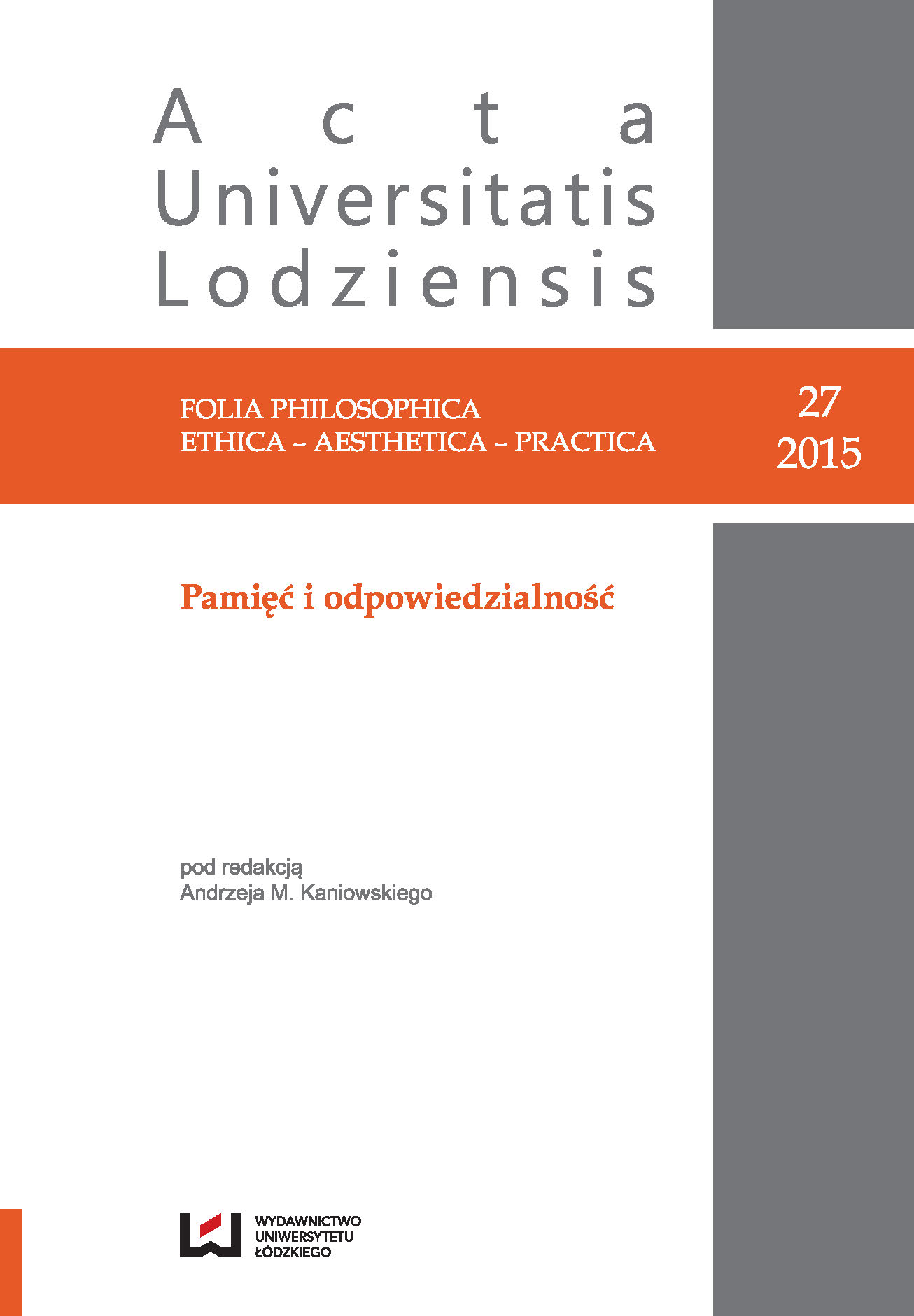Między polityką a prawem, czyli o sprawiedliwości okresu przejściowego
DOI:
https://doi.org/10.18778/0208-6107.27.02Słowa kluczowe:
sprawiedliwość transformacyjna, pamięć zbiorowa, normy moralne, legalizm, podstawy prawaAbstrakt
Artykuł jest teoretyczną analizą strategii prawnych wprowadzonych w krajach przechodzących transformację polityczną (w państwach postkomunistycznych w Europie, w Australii, w Południowej Afryce), używanych przy radzeniu sobie ze skutkami dawnych reżimów politycznych. Zdaniem autora rozpoczęcie dyskusji na temat zła dawnych reżimów jest ważne dla zwiększenia zaangażowania społeczeństwa w budowaniu nowego ładu prawnego. Prawna «odpłata» jest wyrazem publicznego potępienia popełnionych zbrodni i potwierdza istnienie norm publicznych. Jednak idąc tropem argumentów Judith Shklar i Niklasa Luhmanna, autor ostrzega przed wewnętrznymi ograniczeniami instrumentów prawnych w definiowaniu przestrzeni stosunków społecznych i relacji o charakterze moralnym. Antidotum na ewentualną instrumentalizację prawa dla celów politycznych i dominację regulacji prawnych w sferze publicznej należy w związku z tym szukać w niezależnych badaniach historycznych i debacie kulturowej, która zmierza do głębszego zrozumienia przeszłości.
Bibliografia
Bass, Gary J., Stay the Hand of Vengeance: The Politics of War Crimes Trials, Princeton University Press, Princeton 2000.
Google Scholar
Blustein, Jeffrey, The Moral Demands of Memory, Cambridge University Press, Cambridge 2008.
Google Scholar
Braithwaite, John, Restorative Justice and Responsive Regulation, Oxford University Press, Oxford 2002.
Google Scholar
Convention and Innovation in Literature, edited by Theo D’haen, Rainer Grüberl and Helmut Lethen, John Benjamins Publishing Company, Amsterdam and Philadelphia 1989.
Google Scholar
Czarnota, Adam, Radykalne zło a prawo. Jak zmierzyć się z trudna przeszłością. Przewodnik po literaturze, „Ius et Lex” vol. II, 1/2003.
Google Scholar
Dworkin, Ronald, Law’s Empire, London 1986 [przekład polski: Imperium prawa, tłum. Jan Winczorek, Wolters Kluwer SA, Warszawa 2006].
Google Scholar
Dyzenhaus, David, Judging the Judges, Judging Ourselves. Truth, Reconciliation and the Apartheid Legal Order, Hart Publishing, Oxford 1998.
Google Scholar
Elster, Jon, Closing the books. Transitional justice in historical perspective, Cambridge University Press, Cambridge 2004.
Google Scholar
Furet, François, Revolutionary France 1770–1880, Oxford University Press, Oxford 1995.
Google Scholar
Garland, David, Punishment and Modern Society. A Study in Social Theory, University of Chicago Press, Chicago 1993.
Google Scholar
Hayner, Priscilla B., Unspeakable Truths: Confronting State Terror and Atrocity, Routledge, New York and London 2001.
Google Scholar
Margalit, Avishai, The Ethics of Memory, Harvard University Press, Cambridge 2004.
Google Scholar
McEvoy, Kieran, Beyond Legalism: Towards a Thicker Understanding of Transitional Justice, „Journal of Law and Society”, vol. 34, nr 4, 2007.
Google Scholar
Niňo, Carlos S., Radical Evil on Trial, Yale University Press, New Haven 1996.
Google Scholar
Nora, Pierre, Realms of Memory: Rethinking the French Past, Columbia University Press, New York 1996–1998.
Google Scholar
Osiel, Mark, Law and Collective Memories, Transaction Publishers, New Brunswick and London, 1997.
Google Scholar
Raeff, Mark, The Well-ordered police-state: social and institutional change trough law in Germanies and Russia, 1600–1800, Yale University Press, New Haven 1983.
Google Scholar
Rev, Istvan, Retroactive Justice. A Prehistory of Post-Communism, Stanford University Press, Stanford 2006.
Google Scholar
Sadurski, Wojciech, Rights Before Courts. A Study of Constitutional Courts in Postcommunist States of Central and Eastern Europe, Springer, Dordrecht 2005.
Google Scholar
Schaap, Andrew, Political Reconciliation, Routledge, London and New York 2005.
Google Scholar
Schapiro, Martin; Alec Stone Sweet, On Law, Politics and Judicialization, Oxford University Press, Oxford 2002.
Google Scholar
Schwan, Gesine, Politics and Guilt. The Destructive Power of Silence, trans. T. Dunlap, University of Nebraska Press, Lincoln 2001.
Google Scholar
The 'Healing' Value of Truth-telling: Chances and Social Conditions in Secularized World, “Social Research”, vol. 65, nr 4, 1998.
Google Scholar
Shklar, Judith N., Legalism: Law, Morals and Political Trials, Harvard University Press, Cambridge 1986.
Google Scholar
Sriram, Chandra Lekha, Transitional justice comes of ages. Enduring lessons and challenges, “Berkeley Journal of International Law”, vol. 23, nr 2, 2005.
Google Scholar
Stone Sweet, Alec, Governing with Judges: Constitutional Politics in Europe, Oxford University Press, Oxford 2000.
Google Scholar
The Judicial Construction of Europe, Oxford University Press, Oxford 2004.
Google Scholar
Tamanaha, Brian Z., Law as a Means to an End. Threat to the Rule of Law, Cambridge University Press, Cambridge 2006.
Google Scholar
Teitel, Ruti, Transitional Justice, Oxford University Press, New York 2000.
Google Scholar
Traditional Justice and Reconciliation after Violent Conflict. Learning from African Experiences, edited by Luc Huyse and Mark Salter, International IDEA, Stockholm 2008.
Google Scholar
Veitch, Scott, Law and Irresponsibility. On the legitimation of human suffering, Routledge-Cavendish, London 2007.
Google Scholar
Moral Conflict and Legal Reasoning, Hart Publishing, Oxford 1999.
Google Scholar
Pobrania
Opublikowane
Jak cytować
Numer
Dział
Licencja

Utwór dostępny jest na licencji Creative Commons Uznanie autorstwa – Użycie niekomercyjne – Bez utworów zależnych 4.0 Międzynarodowe.












